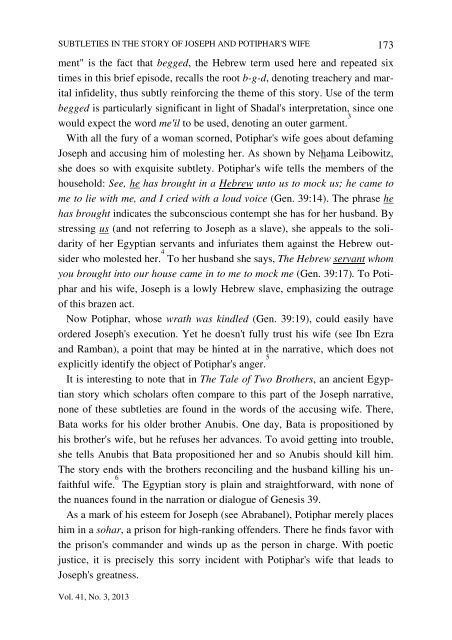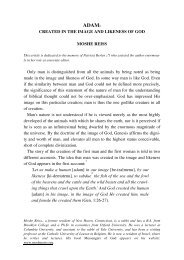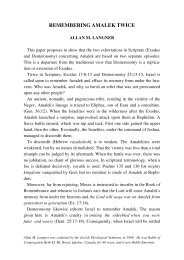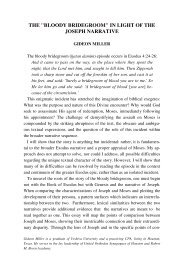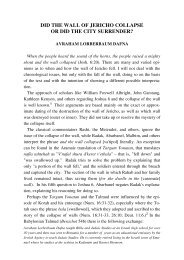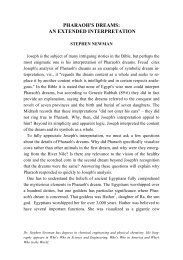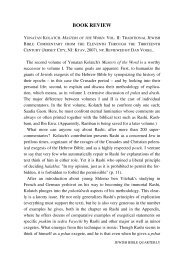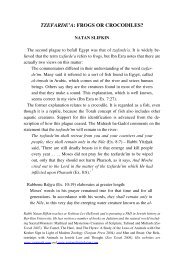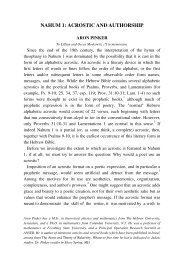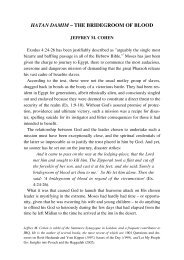subtleties in the story of joseph and potiphar's wife - Jewish Bible ...
subtleties in the story of joseph and potiphar's wife - Jewish Bible ...
subtleties in the story of joseph and potiphar's wife - Jewish Bible ...
Create successful ePaper yourself
Turn your PDF publications into a flip-book with our unique Google optimized e-Paper software.
SUBTLETIES IN THE STORY OF JOSEPH AND POTIPHAR'S WIFE<br />
ment" is <strong>the</strong> fact that begged, <strong>the</strong> Hebrew term used here <strong>and</strong> repeated six<br />
times <strong>in</strong> this brief episode, recalls <strong>the</strong> root b-g-d, denot<strong>in</strong>g treachery <strong>and</strong> marital<br />
<strong>in</strong>fidelity, thus subtly re<strong>in</strong>forc<strong>in</strong>g <strong>the</strong> <strong>the</strong>me <strong>of</strong> this <strong>story</strong>. Use <strong>of</strong> <strong>the</strong> term<br />
begged is particularly significant <strong>in</strong> light <strong>of</strong> Shadal's <strong>in</strong>terpretation, s<strong>in</strong>ce one<br />
would expect <strong>the</strong> word me′il to be used, denot<strong>in</strong>g an outer garment. 3<br />
With all <strong>the</strong> fury <strong>of</strong> a woman scorned, Potiphar's <strong>wife</strong> goes about defam<strong>in</strong>g<br />
Joseph <strong>and</strong> accus<strong>in</strong>g him <strong>of</strong> molest<strong>in</strong>g her. As shown by Nehama Leibowitz,<br />
she does so with exquisite subtlety. Potiphar's <strong>wife</strong> tells <strong>the</strong> members <strong>of</strong> <strong>the</strong><br />
household: See, he has brought <strong>in</strong> a Hebrew unto us to mock us; he came to<br />
me to lie with me, <strong>and</strong> I cried with a loud voice (Gen. 39:14). The phrase he<br />
has brought <strong>in</strong>dicates <strong>the</strong> subconscious contempt she has for her husb<strong>and</strong>. By<br />
stress<strong>in</strong>g us (<strong>and</strong> not referr<strong>in</strong>g to Joseph as a slave), she appeals to <strong>the</strong> solidarity<br />
<strong>of</strong> her Egyptian servants <strong>and</strong> <strong>in</strong>furiates <strong>the</strong>m aga<strong>in</strong>st <strong>the</strong> Hebrew outsider<br />
who molested her. 4 To her husb<strong>and</strong> she says, The Hebrew servant whom<br />
you brought <strong>in</strong>to our house came <strong>in</strong> to me to mock me (Gen. 39:17). To Potiphar<br />
<strong>and</strong> his <strong>wife</strong>, Joseph is a lowly Hebrew slave, emphasiz<strong>in</strong>g <strong>the</strong> outrage<br />
<strong>of</strong> this brazen act.<br />
Now Potiphar, whose wrath was k<strong>in</strong>dled (Gen. 39:19), could easily have<br />
ordered Joseph's execution. Yet he doesn't fully trust his <strong>wife</strong> (see Ibn Ezra<br />
<strong>and</strong> Ramban), a po<strong>in</strong>t that may be h<strong>in</strong>ted at <strong>in</strong> <strong>the</strong> narrative, which does not<br />
explicitly identify <strong>the</strong> object <strong>of</strong> Potiphar's anger. 5<br />
It is <strong>in</strong>terest<strong>in</strong>g to note that <strong>in</strong> The Tale <strong>of</strong> Two Bro<strong>the</strong>rs, an ancient Egyptian<br />
<strong>story</strong> which scholars <strong>of</strong>ten compare to this part <strong>of</strong> <strong>the</strong> Joseph narrative,<br />
none <strong>of</strong> <strong>the</strong>se <strong>subtleties</strong> are found <strong>in</strong> <strong>the</strong> words <strong>of</strong> <strong>the</strong> accus<strong>in</strong>g <strong>wife</strong>. There,<br />
Bata works for his older bro<strong>the</strong>r Anubis. One day, Bata is propositioned by<br />
his bro<strong>the</strong>r's <strong>wife</strong>, but he refuses her advances. To avoid gett<strong>in</strong>g <strong>in</strong>to trouble,<br />
she tells Anubis that Bata propositioned her <strong>and</strong> so Anubis should kill him.<br />
The <strong>story</strong> ends with <strong>the</strong> bro<strong>the</strong>rs reconcil<strong>in</strong>g <strong>and</strong> <strong>the</strong> husb<strong>and</strong> kill<strong>in</strong>g his unfaithful<br />
<strong>wife</strong>. 6 The Egyptian <strong>story</strong> is pla<strong>in</strong> <strong>and</strong> straightforward, with none <strong>of</strong><br />
<strong>the</strong> nuances found <strong>in</strong> <strong>the</strong> narration or dialogue <strong>of</strong> Genesis 39.<br />
As a mark <strong>of</strong> his esteem for Joseph (see Abrabanel), Potiphar merely places<br />
him <strong>in</strong> a sohar, a prison for high-rank<strong>in</strong>g <strong>of</strong>fenders. There he f<strong>in</strong>ds favor with<br />
<strong>the</strong> prison's comm<strong>and</strong>er <strong>and</strong> w<strong>in</strong>ds up as <strong>the</strong> person <strong>in</strong> charge. With poetic<br />
justice, it is precisely this sorry <strong>in</strong>cident with Potiphar's <strong>wife</strong> that leads to<br />
Joseph's greatness.<br />
Vol. 41, No. 3, 2013<br />
173


